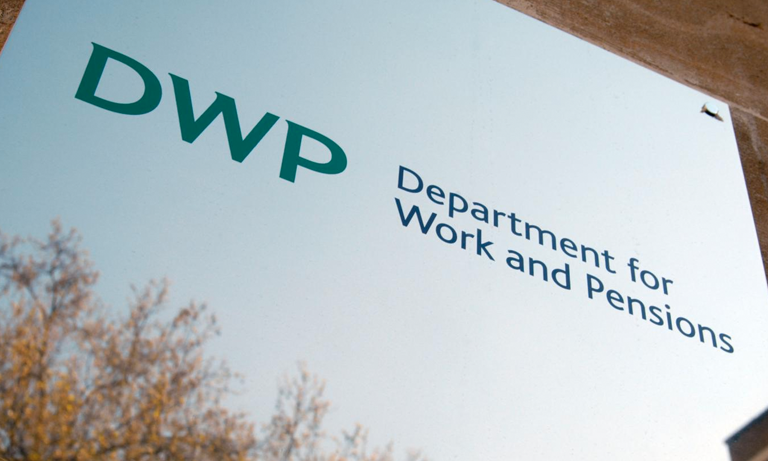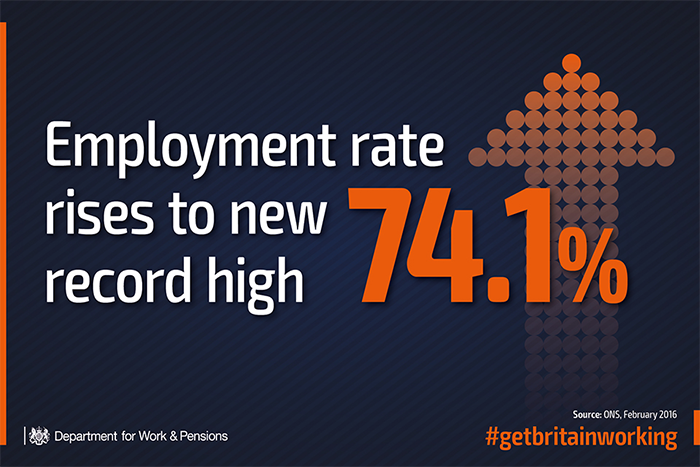 The gender employment rate gap is at a near-record low, just 8.9%
The gender employment rate gap is at a near-record low, just 8.9%There are now a record 31.4 million people in work – up 521,000 compared with this time last year, fuelled by a rise in full-time employment – and there are a record 776,000 job vacancies, reflecting the economy’s strong performance.
The unemployment rate is the lowest in a decade, at 5.1%, and the proportion of young people who have left full time education and are unemployed has fallen to 5.6% – the lowest on record.

Wages before bonuses have continued to grow, with an increase of 2% compared with this time last year (inflation over this period was relatively flat) and the number of people claiming unemployment-related benefits is at its lowest level since 1975.
Secretary of State for Work and Pensions Iain Duncan Smith said:
“February is another record-breaking month with the employment rate now at the highest it has ever been and wages continuing to grow.
“At a time when we are seeing the number of workless households at its lowest ever, this is further proof that our economic and welfare reforms are delivering more security and providing opportunities that give families the best chance in life.”
Minister for Disabled People Justin Tomlinson said:
“It is vital we stay the course with our long-term economic plan, to ensure more hardworking families benefit from the country’s growing economy.
“There are now 150,000 more disabled people in work over the past year, which is fantastic news.
“By working to halve the disability employment gap, we want to make sure more people can reap the positive financial and health rewards of employment, and are helped to achieve their ambitions.”
Among the record-breaking figures released today:
- the employment rate of older people, aged 50 to 64, is at a new record high of 70.1%
- the employment rate of young people who have left full-time education is at a 10-year high of 74.7%
- over a million more women are in work since 2010 and the female employment rate remains at a record high
- 150,000 more disabled people are now in work over the past year
The government is committed to helping those further from the labour market into work, and spends £50 billion each year on benefits alone to support people with disabilities and health conditions.
Kirstie Donnelly, Managing Director, City & Guilds, said:
“The fact that employment has reached a record rate today is cause for celebration – but not for complacency. However, we can’t afford to lose sight of the fact that youth unemployment remains stubbornly high, representing hundreds of thousands of young people locked out of a path to the future.
“At the core of this is our failure to ensure young people have the employability skills and workplace understanding they need to get on. We recently surveyed 14 to 19 year olds, and found that almost 70% planned to go to university despite only 30% of available jobs forecast to be graduate roles. We must provide young people with an accurate picture of the labour market while they are still at school considering their options. That means using labour market information and the latest data on skills gaps to shape careers advice, rather than falling back on the same advice we have given for a generation.”
Since the launch of the Disability Confident campaign in 2013, which sees the government working with businesses so they understand the benefits of recruiting and retaining disabled people, there are more disabled people in work – up 293,000 over the past 2 years.
Universal Credit is transforming lives across the country with over 10,500 people on average claiming the new benefit every week. Over 364,000 claims have been made to Universal Credit and a third of those receiving the benefit are in work.
Join Over 40,000 Recruiters. Get our latest articles weekly, all FREE – SEND ME ARTICLES
Recruiters love this COMPLETE set of Accredited Recruitment & HR Training – View Training Brochure








